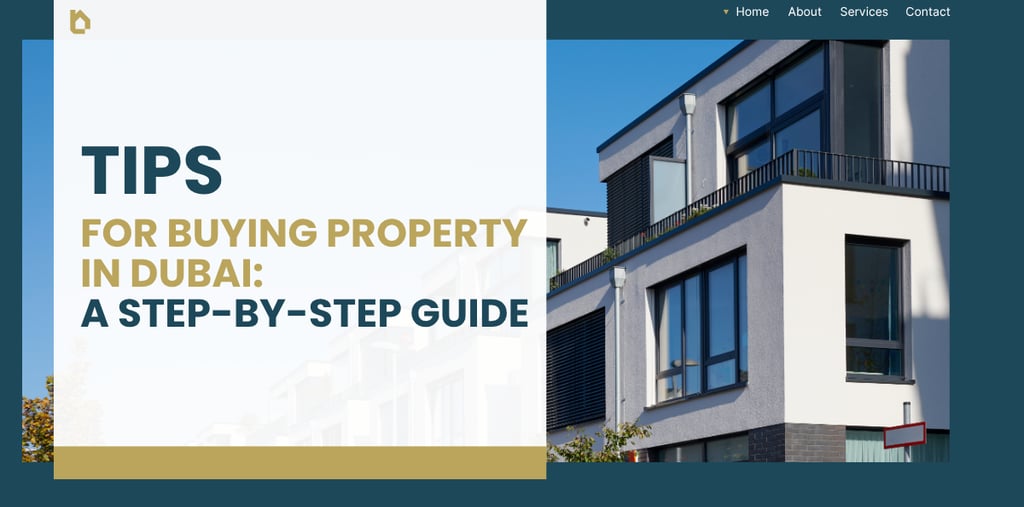Tips for Buying Property in Dubai: A Step-by-Step Guide
Learn step-by-step tips for buying property in Dubai. Discover trusted agencies, best areas to invest, rental yields, and legal advice for Dubai Real Estate.
REAL ESTATE
Asad Ali
10/18/20254 min read


Introduction
Dubai’s skyline is known across the world — glittering towers, luxury villas, and waterfront apartments that define modern living. Over the last decade, Dubai Real Estate has become a global symbol of opportunity, stability, and growth.
From the Dubai residence complex projects in emerging areas to the ultra-luxury villas on Palm Jumeirah, the city offers every kind of property for investors and end-users alike.
But if you’re planning to buy your first home or investment unit in Dubai, you might be wondering: Where do I start?
This article is a step-by-step guide to help you understand the process of buying property in Dubai — from finding the right project to securing your title deed. You’ll also learn how investors maximize rental yield in Dubai, which areas offer the best returns, and how to work with trusted professionals like a real estate consultant in Dubai.
The Story: A First-Time Buyer’s Journey
Let’s begin with a short story.
Zara, a business owner living in London, dreamed of owning an apartment in Dubai. She had heard about the strong economy, tax-free income, and high ROI that Dubai International Real Estate is famous for.
However, when she started searching online, she found hundreds of listings — from Dubai houses for sale luxury to affordable studios in newer communities. The information was overwhelming.
After consulting a licensed real estate consultant in Dubai, Zara learned how to navigate the process properly — from choosing the right area to completing the transaction through a trustee office in Dubai.
A year later, her investment in a one-bedroom apartment in Jumeirah Village Circle started generating an 8% rental yield — higher than what she could earn in most major cities.
Here’s the same step-by-step process that helped Zara succeed.
Step 1: Research the Dubai Real Estate Market
Before buying property, understand how Dubai Real Estate works.
Dubai’s property market offers two main ownership types:
Freehold: Foreigners can buy and fully own the property and the land beneath it.
Leasehold: Property is leased for a fixed period (commonly 99 years).
The freehold areas are where most foreign buyers invest. Communities like Downtown Dubai, Dubai Marina, JVC, Dubai Hills, and Arjan are some of the best areas to invest in Dubai.
Keep an eye on updates from the Dubai Land Department (DLD) and Emirates Real Estate Corporation, as they regulate and maintain transparency in property transactions.
Step 2: Define Your Goal
Ask yourself what you want to achieve:
Do you want a home to live in?
Are you looking to invest in real estate in the UAE for rental income?
Or do you plan to buy and resell for profit?
If you want high rental yield in Dubai, consider apartments in areas like JVC, Arjan, and Dubai South.
If you want a luxury lifestyle, focus on Dubai houses for sale luxury in communities such as Palm Jumeirah, Dubai Hills Estate, and Emirates Hills.
Having a clear purpose will help you make smarter financial decisions.
Step 3: Work with a Licensed Real Estate Consultant in Dubai
The real estate market in Dubai is regulated and professional. Always work with a RERA-certified agent or company.
Your consultant can help you:
Shortlist properties based on your goals.
Compare developer offers and payment plans.
Handle documentation and registration with the trustee office in Dubai.
A trusted consultant also ensures all transactions are conducted legally through DLD-approved escrow accounts, protecting your investment.
Step 4: Choose the Right Property Type
Dubai offers diverse property options:
Studios and 1-bedroom apartments — low entry cost, good for rental income.
Townhouses and villas — higher budgets, ideal for long-term appreciation.
Commercial spaces — offices and retail units for business investors.
If you’re a new investor, consider best house investments like mid-range apartments in developing areas — they often deliver the best ROI percentage.
Step 5: Explore Financing Options
You can buy property in Dubai either with full payment or through a mortgage.
Banks offer financing to both residents and non-residents, provided certain conditions are met:
Valid passport or Emirates ID
Proof of income
Minimum 20–25% down payment
Mortgage approvals usually take 7–14 days. Remember to factor in service charges and maintenance fees, which vary by community.
Step 6: Check the Developer’s Reputation
Before you commit, always verify the developer. Research their track record — look at delivery timelines, construction quality, and previous customer feedback.
Reputable developers such as Emaar, Damac, Sobha, Binghatti, and Dubai Properties have consistent credibility.
You can verify ongoing projects using the Dubai Property App or the DLD’s REST App to ensure legitimacy and progress transparency.
Step 7: Understand the Legal Process
Here’s a simplified version of the buying process for both off-plan and ready properties:
Reservation Form – You sign an agreement with the developer or seller.
Down Payment – Usually 10–20% of the property price.
Sales Agreement (SPA) – Outlines payment schedule and delivery details.
Registration – Conducted through the trustee office in Dubai and DLD.
Title Deed Issuance – Confirms your ownership.
All payments for off-plan properties go into escrow accounts, ensuring developer accountability.
Step 8: Compare Off-Plan and Ready Properties
Both options have their advantages:
Off-plan: Lower prices, flexible payment plans, potential for appreciation before handover.
Ready properties: Immediate handover, potential rental income from day one.
Zara chose an off-plan project in a Dubai residence complex in JVC. By the time it was completed, the property’s value had risen by 18%, proving how early investments can deliver strong returns.
Step 9: Know the Best Areas to Invest in Dubai
Dubai offers different opportunities depending on your budget and goal:
Luxury Sector: Dubai Hills Estate, Palm Jumeirah, Business Bay, and Downtown Dubai.
Mid-range Sector: Jumeirah Village Circle, Arjan, and Dubai South.
High Rental Yield Zones: International City, JVC, and Sports City.
Infrastructure developments like the Blue Line Metro and new master communities near Academic City are opening up more affordable investment options.
Step 10: Plan for the Future
Dubai is not just a city for short-term gains; it’s a long-term investment hub.
Experts predict that the market will continue to expand, driven by the Dubai International Real Estate Vision 2040, population growth, and ongoing infrastructure projects.
If you plan to manage multiple properties or expand your portfolio, consider applying for a broker license in Dubai or partnering with trusted property management firms.
As your portfolio grows, the key is to stay informed through official sources like the Emirates Real Estate Corporation and DLD updates.
Conclusion
Buying property in Dubai is a smart decision — but success depends on knowledge, patience, and professional guidance.
Start by understanding the market and setting clear goals. Choose reliable developers, consult licensed agents, and ensure every transaction goes through official channels.
Whether you’re purchasing in a Dubai residence complex, a luxury villa, or a mid-range community with high rental yield, Dubai offers unmatched opportunities for growth and stability.
Like Zara’s story shows, the right strategy can turn your dream property into a profitable investment — and a gateway to financial freedom in one of the world’s most dynamic cities.
